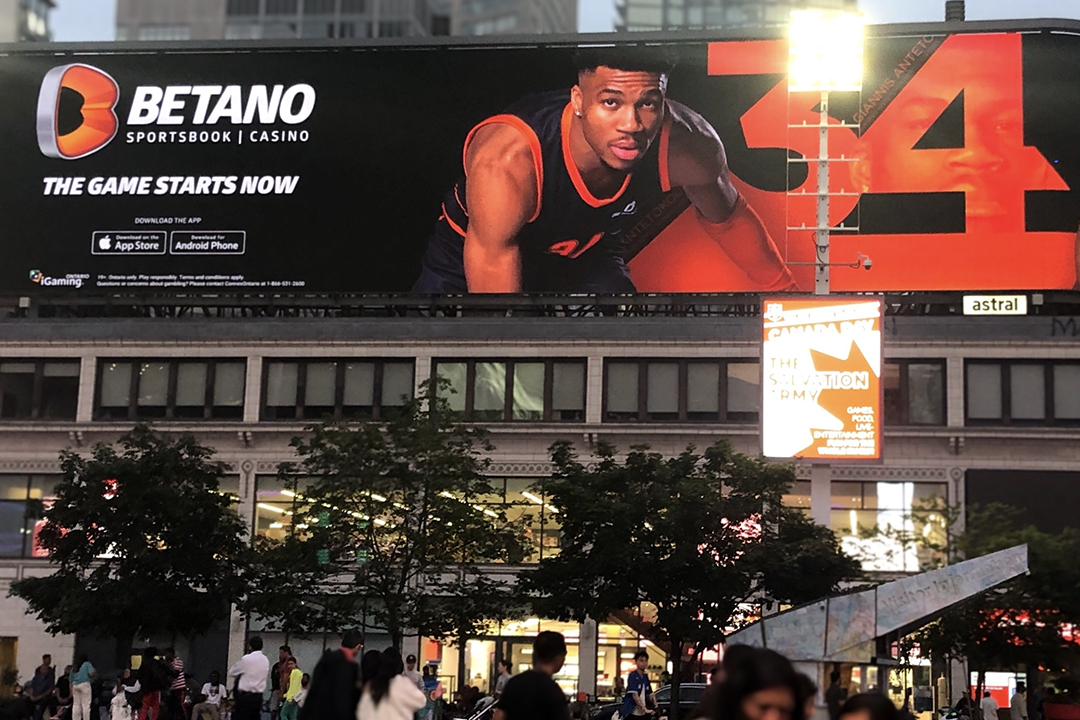On August 5, 2023, the steering committee of the Campaign to Ban Advertising for Gambling published a white paper outlining the economic and human impact of sports gambling ads. The white paper describes the campaign’s proponents as “a group of sports-loving Canadians deeply disturbed by the proliferation and content of advertising for sports betting during televised sports, on social media, and on billboards in and around arenas and stadia.”
The campaign calls for the Canadian government to ban gambling ads in phases, but does not seek to ban gambling itself.
By the numbers: gambling and mental health
To gain a better understanding of the national prevalence of gambling behaviours, Statistics Canada carried out a study as part of the 2018 Canadian Community Health Survey. The survey found that 64.5 per cent of Canadians aged 15 or older gambled at least once in the previous year. At 72.3 per cent, people aged 45 to 64 had the highest rate of gambling in the previous year, while those aged 15 to 24 had the lowest likelihood, at 43.9 per cent.
Statistics Canada found that 7.9 per cent of Canadians bet on sports in the previous year, and 95 per cent of Canadians who gambled exhibited nonproblem gambling. However, 1.6 per cent of Canadians aged 15 or older who gambled — 304,000 people — were at moderate-to-severe risk of developing gambling disorders.
The revised version of the Diagnostic and Statistical Manual of Mental Disorders, Fifth Edition, Text Revision (DSM-5-TR) classifies a gambling disorder as a substance-related and addictive disorder. According to the DSM-5-TR, “gambling behaviours activate reward systems similar to those activated by drugs.” Furthermore, gambling disorder involves “persistent and recurrent maladaptive gambling behaviour” that negatively affects a person’s significant personal relationships, education, or career. Gambling-related harm may be similar in magnitude to harm related to major depressive disorder or alcohol dependence.
The campaign to ban gambling ads
A survey conducted by Ipsos in November 2022 found that 48 per cent of Canadians aged 18 and older agree that “the amount and volume of [gambling] advertising is excessive and needs to be cut back.” 63 per cent of Canadians agreed that the “amount and/or placement” of gambling ads should be subject to limits. Ipsos found that negative posts about sports betting ads increased by 820 per cent between July and October 2022.
Appalled by the harm gambling poses to sports and vulnerable populations like young people, Kidd and other like-minded individuals formed the steering committee of the Campaign to Ban Advertising for Gambling. Other members of the committee affiliated with U of T include Gretchen Kerr, the Dean of the Faculty of Kinesiology and Physical Education, and Peter Donnelly, a Professor Emeritus of Sport Policy and Politics.
The committee sent a letter to the Minister of Canadian Heritage — whose mandate includes sports, the arts, multiculturalism, heritage, equity, and inclusion — on April 26, 2023. The letter called for a public hearing “to investigate public harm resulting from the proliferation of sports gambling ads” in Canadian media and on social media. They urged the government to “develop policies and regulations” to mitigate harm from gambling ads.
According to Kidd, the committee has also urged federal, provincial, and territorial governments to “prohibit betting on Olympic, Paralympic, amateur and educational (school, college and university) sports.”
Why raise this opposition now? The steering committee of the Campaign to Ban Advertising for Gambling based their campaign on the efforts to ban ads for tobacco. “[I]t took decades for Canadian governments to recognize the harm from tobacco and the way the ads encouraged people to smoke, especially children, youth and other vulnerable people,” Kidd said. “Since the harm from gambling ads is so clear, we want to reduce that harm immediately, not wait until it [becomes] an epidemic.”
Sports betting’s effects on vulnerable populations
Kidd’s background as a track and field athlete informs his disdain for gambling ads. He has won 18 national championships throughout his career and was inducted into the Canadian Olympic Hall of Fame twice, as an athlete in 1966 and then a builder of the sport in 1994 for the work he’d done since retiring as an athlete.
He said that the suggestion by some sports commentators that betting deepens viewers’ enjoyment of sports “completely ignores the joy of active participation, embodied self-learning, sense of community, and cultural richness of sports.” Kidd also argues that the beneficiaries of sports betting “do not have to pay the social costs of gambling addictions and the fall in active participation that an increase in sports betting encourages.” Those costs are instead passed on to others in society.
In 2021, Canada legalized single-game sports betting. In the lead-up to legalization, Kidd was surprised to see that the majority of the submissions to Canadian parliament on the issue focused on match-fixing, “not the harms to children, youth and other vulnerable people, despite the concerns expressed in and the steps being taken in other countries.” He pointed out that, according to estimates, children under 18 make up ten per cent of the audience watching sports on television. He has heard from young people, including athletes, who are “going into hopeless debt because of sports betting.”
A March 2023 study published in Health Promotion International notes that governments around the world have failed to keep up with rapid evolutions in the gambling industry. Governments often stress personal responsibility and self-control over stringent regulation, echoing the gambling industry’s minimization of the harm that results from gambling.
The same study also suggests that gambling ads encourage young people to view gambling as ‘risk-free.’ Celebrity promotions, in particular, nurture children’s trust in gambling brands. “Like other harmful industries [e.g., alcohol and tobacco], gambling companies must ensure a continuing customer base,” the researchers noted. “This includes attracting young people who may be future gamblers, consuming an increasingly novel and sophisticated range of products.”


